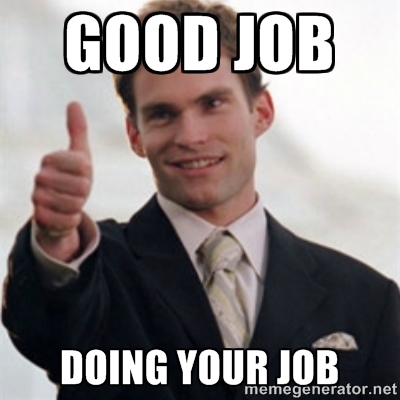Compliments are a surefire way to change the tone around your office. They can brighten someone’s day or make things incredibly…awkward. Giving compliments well isn’t that comes naturally to most people (neither is receiving compliments). But, I’m going to mention the ‘m’ word – millennials. Keeping employees engaged in the future will likely mean everyone needs to learn how to provide constructive feedback around the office.
A Gallup poll found growing up in constant contact with digital communication increases the desire for feedback at the workplace for millennials. But of those polled, only 19 percent said they received routine feedback, and only 17 percent found that feedback to be useful.
Moral of the story? It’s time to up your feedback game at the office. And while constructive criticism is important, so are compliments. If you’re an old-school manager, the constructive criticism probably comes easily. The compliments? Not so much. Here are a few tips to better complimenting someone on your team.
1. Don’t tell them ‘good job.’
Telling someone ‘good job’ after they complete a project is really bottom fishing in the world of compliments. Nothing says ‘I’m providing compulsory feedback which required no effort’ quite like a ‘good job’ compliment. A good compliment is specific – ideally specific to a task or accomplishment, but it might be more broadly focused on performance. ‘I’ve noticed you really shine when you’re presenting a new feature to our customers – thanks for taking the time to explain things so well.’ Or, here’s a compliment I heard recently that stood out ‘You’re like the Swiss Army Knife at the office – you’re sharp and have all of the skills to make things work!’

2. Don’t say ‘you’re the best.’
Comparison compliments are the passive aggressive compliment. They tell someone, ‘you’ve done well, but you’ll still never be as good as Bob.’ Even telling an employee they’re the best on the team is probably a bad idea. In team environments, employees want to know they’re working in the company of fellow rock stars. If you tell an employee they’re the best, they may think they don’t have areas where they need to grow. Your constructive criticism won’t land as well after they’ve just been told they’re at the top. Put your employees in a competition to out perform themselves – not each other.
3. Don’t make it too rehearsed.
Annual reviews are serious. Regular feedback and compliments shouldn’t be. It’s okay to keep a draft email of great things you’ve heard about your employees, or kudos you’d like to mention later…but don’t make presenting those things too strained. If you’re socially awkward (or don’t work in the same office as your subordinates), it’s okay to email feedback. Do what comes more naturally to you, and it will be more appreciated by the person on the receiving end.
Giving compliments is like any soft skill – it’s something you can improve over time. The trick is simply to start. Begin by thinking of where you’d like to motivate your employees, where they’re currently achieving great things (if they are!), and how they’re working as a team. Have a great – or terrible – compliment you’ve received at the office? Share it in the comments!




